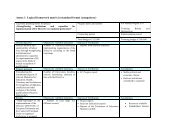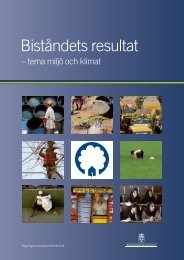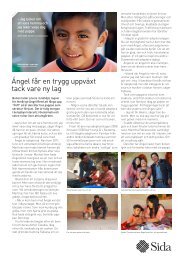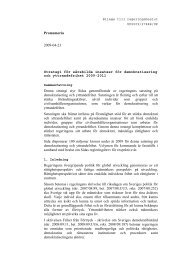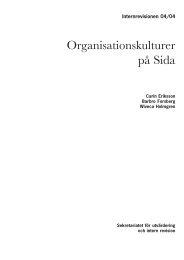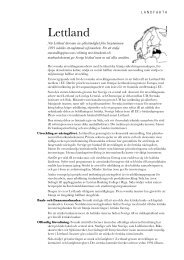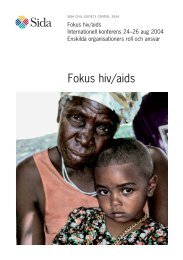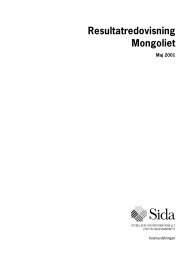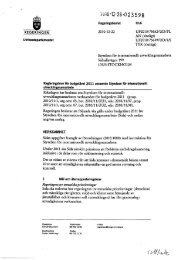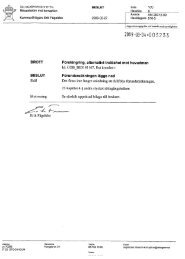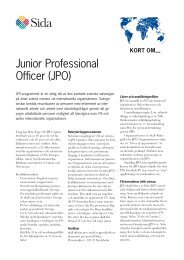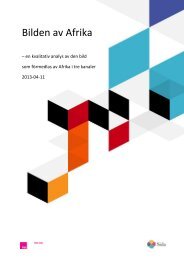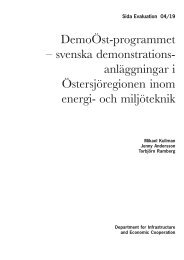Mid-Term Review of the AGIR Programme - Sida
Mid-Term Review of the AGIR Programme - Sida
Mid-Term Review of the AGIR Programme - Sida
You also want an ePaper? Increase the reach of your titles
YUMPU automatically turns print PDFs into web optimized ePapers that Google loves.
2 F I N D I N G S<br />
Through campaigns <strong>of</strong> sensitisation, radio programmes, public demonstrations<br />
Diakonia partners, MULEIDE and AMMCJ, are contributing to increases in<br />
<strong>the</strong> number <strong>of</strong> denouncements <strong>of</strong> violence against women.<br />
A group <strong>of</strong> civil society organisations, led by Rede da Criança and Rede<br />
CAME, are pressuring <strong>the</strong> government to regulate and enforce legislation on<br />
children’s rights.<br />
ACAMO, through its activism and advocacy work, influenced better access <strong>of</strong><br />
services and education to blind people, promoting training <strong>of</strong> teachers to deal<br />
with blind students and <strong>the</strong> inclusion <strong>of</strong> blind people in <strong>the</strong> Institute for Employment<br />
and Vocational training (INEFP).<br />
A group <strong>of</strong> organisations by <strong>the</strong> Electoral Observatory and <strong>AGIR</strong> partners and<br />
o<strong>the</strong>r civil society organisations have promoted debate on <strong>the</strong> revision <strong>of</strong> <strong>the</strong><br />
electoral law and <strong>the</strong> parliament acknowledges <strong>the</strong> EO as legitimate interlocutor<br />
in this matter.<br />
2.5.2 A Focus on National-Level CSO Partners and its Impact <strong>of</strong> <strong>the</strong> Achievement <strong>of</strong><br />
Outcomes (Present and Future)<br />
In accordance with <strong>Sida</strong>’s initial guidelines for <strong>the</strong> programme, 28 key <strong>AGIR</strong>actors are<br />
defined as follows:<br />
a. National organisations/social movements with structures at lower levels and<br />
network organisations.<br />
b. National-level watchdog or research organisations which can prove <strong>the</strong>ir legitimacy.<br />
c. National-level Human Rights organisations, focusing on support to women’s<br />
rights, child rights and <strong>the</strong> rights those affected by HIV/ AIDS.<br />
The guidelines fur<strong>the</strong>r state that outreach is important and that <strong>the</strong> Swedish Embassy<br />
considers national organisations with genuine structures at lower levels and network<br />
organisations as key actors, while – according to <strong>the</strong> guidelines – national level organisations<br />
without structures at lower levels need to prove <strong>the</strong>ir legitimacy to obtain<br />
support.<br />
On this basis, <strong>the</strong> intermediaries, all with strong backgrounds in community-based<br />
development, focused on <strong>the</strong> recruitment <strong>of</strong> national-level partners <strong>of</strong> all three types<br />
listed in <strong>the</strong> guidelines until a more flexible approach was adopted by <strong>the</strong> Swedish<br />
embassy, which resulted in some recruitment <strong>of</strong> strategic direct local partners effectively<br />
from 2012. Although <strong>the</strong> focus on central-level partners is leading to results, as<br />
demonstrated above, <strong>the</strong>re are critical aspects related to this approach as well, which<br />
28 Guidelines: The Swedish Embassy’s Support to Mozambican Civil Society Organisations; 2009-02-05.<br />
59



